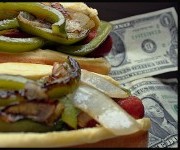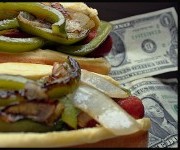
Eating farmers market fare will pay off for food stamp recipients in Philly. (Photo by Richard Alexander Caraballo.)
We now have more evidence of the effectiveness of healthy food subsidies, thanks to a pilot program in Philadelphia. Philly Food Bucks offers food stamps recipients a 40 percent subsidy at farmers markets. In other words, shoppers get a $2 subsidy for every $5 they spend in food stamps at participating farmers markets. In season, farmers markets can be a better deal than supermarkets for produce; I can also report from experience that Philly has many fairly priced farmers markets.
The Food Bucks program is run by the Food Trust, one of the forces behind Philly’s Fresh Food Financing initiative, which funds supermarkets in so-called “food deserts.” It’s a program that has been embraced and taken national by the Obama administration as the Healthy Food Financing initiative.
The Philadelphia Inquirer reports on the promising results from the Philly Food Bucks program:
To fight obesity, the department embarked on a series of nutrition, education, and exercise initiatives with a total cost of $1.5 million received in federal dollars over two years.
Philly Food Bucks, which has cost $160,000 over two years, has shown the most immediate, measurable results.
“These numbers confirm our belief that when fresh fruits and vegetables are available, visible, and affordable, people will eat healthier,” Solomon said.
… In 2009, before the food bucks were issued, Supplemental Nutrition Assistance Program (formerly called food stamps) sales at Food Trust farmers’ markets totaled $11,500. In 2010, that figured more than doubled, to $29,140. And for the 2011 season, which will end after Thanksgiving, sales are poised to far surpass the 2010 numbers.
“Sales just skyrocketed in June and July 2011. We’re on target to sell much more than last year,” said Jon Glyn of the Food Trust, “and that doesn’t count some of the busiest months of the farm market season — August, September, October, and November.”
Philly has become quite the laboratory for innovative anti-obesity programs. Another Food Trust project, the Healthy Corner Store Initiative, whereby healthy food “kiosks” are being installed in around 6,000 600 [ed note: apologies for the misplaced decimal point] Philly corner stores, has also shown promising results. Mayor Michael Nutter has also been in a long-running (though so far unsuccessful) battle to impose a soda tax.
Recent research shows that access to supermarkets alone doesn’t cause people to eat well. This outcome doesn’t surprise me, since most supermarkets are full of unhealthy food. But I find it interesting that these very focused kinds of programs — where produce in particular is subsidized — are successful.
If there’s a downside to Philadelphia’s Food Bucks project, it’s that the city now needs to find a source of ongoing support — its funding will soon run out. But with results like these, there’s every reason to expect that the Food Trust will find the money from public and private sources.
What should we learn from all this success? Well, I’ll leave it to chef and No Reservations star Anthony Bourdain to answer that question:
[T]he notion that hard working, hard-pressed families with little time and slim budgets have to eat crappy, processed food — or that, unspeakably, proudly unhealthy “novelty dishes” that come from nowhere but the fevered imaginations of marketing departments, are — or should be — the lot of the working poor is nonsense.
The good news is that the processed food industry hasn’t figured out how to lobby against healthy food subsidies, which appear to be the programs gaining the most traction with consumers. Or at least not yet: Big Food will no doubt try to devise a way to fight the intolerable desire consumers of all income levels have to find ways to eat better. We’ll just have to fight back harder.



